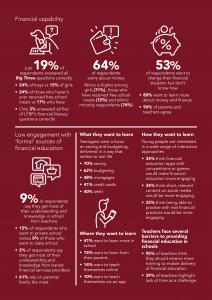Financial Capability in Young People: LFBF Calls for Bold Shift and Bank of England Governor Echoes Need for More Action
Latest research shows low levels of financial capability among UK teenagers - and Bank Governor says findings underline the need for more action.
LONDON, UNITED KINGDOM, November 27, 2025 /EINPresswire.com/ -- The London Foundation for Banking & Finance (LFBF) has today published the latest edition of its Young Persons’ Money Index (YPMI). The LFBF has been tracking the attitudes and behaviours of 15 – 18-year-olds in the UK for over a decade, following the introduction of financial education into the UK national curriculum in September 2014. This year’s findings show that financial capability among Britain’s teenagers remains concerningly low. It also suggests that the timing of the Government’s new Financial Inclusion Strategy offers a once-in-a-generation opportunity for bolder action and greater impact, while Bank of England Governor Andrew Bailey says this year's findings underline the need for more action.Each year the LFBF surveys 2,000 young people across the UK, examining young peoples’ attitudes to money and their access to financial education and information. The key findings of the 2025/26 LFBF Young Person’s Money Index show:
- low levels of financial capability and high levels of anxiety (64% of respondents) about money, with this being more pronounced among females, those receiving free school meals, and ethnic minority respondents
- low engagement with traditional sources of financial education, such as schools and banks. Only 9% of respondents identify school as their main source of financial understanding, with even fewer citing banks (2%).
- parents continuing to be the main providers of information for 61% of respondents – despite many facing barriers in terms of their own financial capability, risking the reproduction of inequality. Only 19% of respondents able to answer all Big Three questions on interest, inflation, and risk correctly and just 3% correctly answering all five of the LFBF own’s financial capability questions.
- a strong appetite to learn more: 80% of teenagers express a desire to learn more about money and finance. 53% of the young respondents wish to improve their financial situation but don’t know how.
Sarah Dryden, LFBF Director of Research, comments “This year’s report coincides with the hugely welcome November 2025 announcement that financial education will be added to the primary school curriculum and strengthened in secondary schools – something our research shows young people hugely desire. We believe this is a key moment in the UK’s journey to make the bold changes that are critical to break cycles of reproduced inequality.”
Bank of England Governor Andrew Bailey says “The findings of this year’s Young Persons’ Money Index underline the need for more action to increase financial literacy and to reduce anxiety about finance. It is reassuring to know that young people have an appetite to learn more, and essential that we collectively find more effective ways of meeting that demand. The Bank of England will continue to play its part in supporting the promotion of financial and economic literacy in schools and use a range of platforms to engage young audiences with content that is both useful and accurate.”
Notes to Editors
The London Foundation for Banking & Finance (LFBF) is a registered charity incorporated by Royal Charter. Its charitable purpose is the advancement of knowledge of and education in financial services, and the conduct and publication of research for public benefit. www.lfbf.org.uk
The LFBF worked with Savanta – an independent research agency to produce this survey – using a mixed-method approach to explore LFBF’s research questions. In line with previous years, this consisted of an online survey of 2,000 young people aged between 15 and 18, to robustly quantify young people’s access to – and experiences with – financial education, as well as their broader confidence and use of money and financial services. Data were weighted by age, gender, and region. Online focus groups (one 90-minute focus group with 15–16-year-olds and one 90-minute focus group with 17–18-year-olds) added nuance to the quantitative data, exploring why young people hold certain perceptions and how they think financial education could be improved. For the second year running we also posed questions to 692 parents, guardians and teachers to get a sense of their attitudes to young people and be improved. For the second year running we also posed questions to 692 parents, guardians and teachers to get a sense of their attitudes to young people and their levels of financial capability.
Sue Primmer
The London Foundation for Banking & Finance
media@lfbf.org.uk
Visit us on social media:
LinkedIn
Legal Disclaimer:
EIN Presswire provides this news content "as is" without warranty of any kind. We do not accept any responsibility or liability for the accuracy, content, images, videos, licenses, completeness, legality, or reliability of the information contained in this article. If you have any complaints or copyright issues related to this article, kindly contact the author above.

